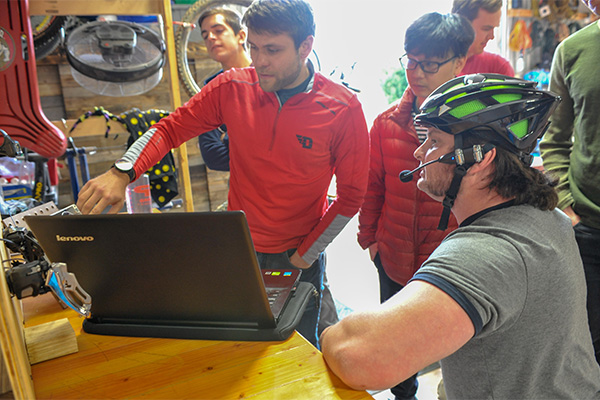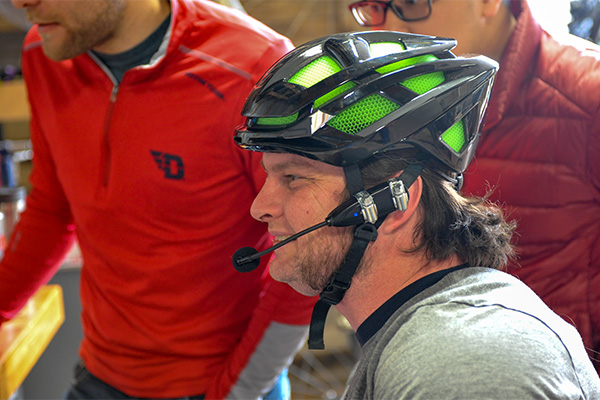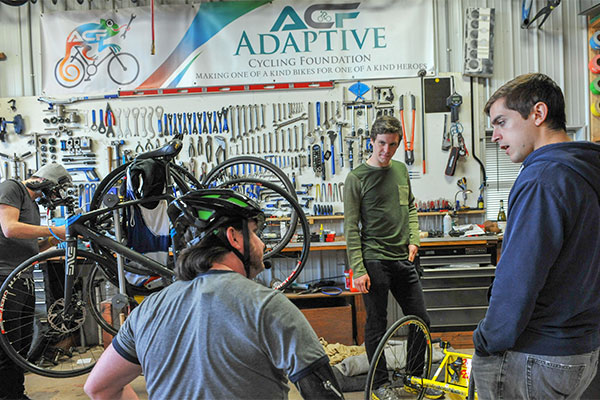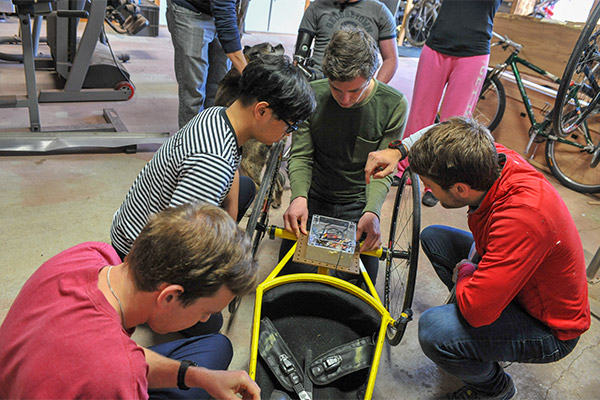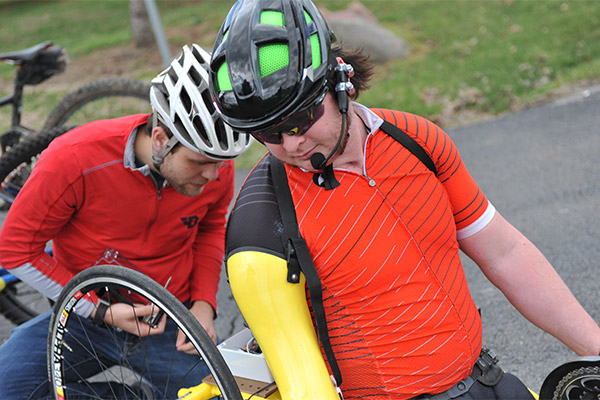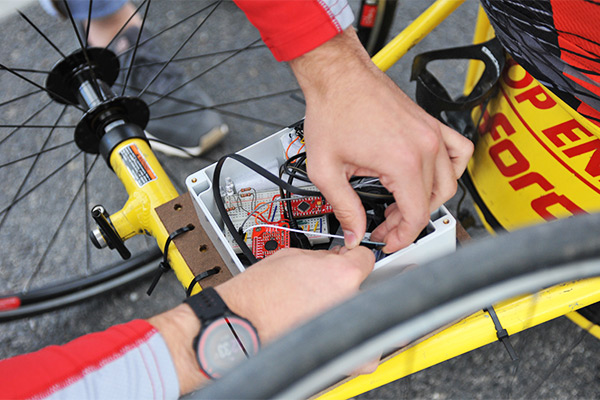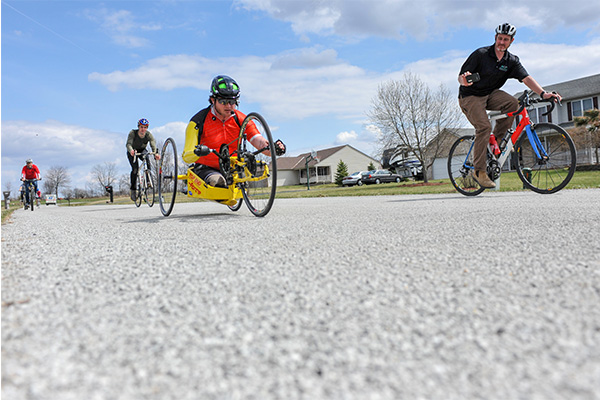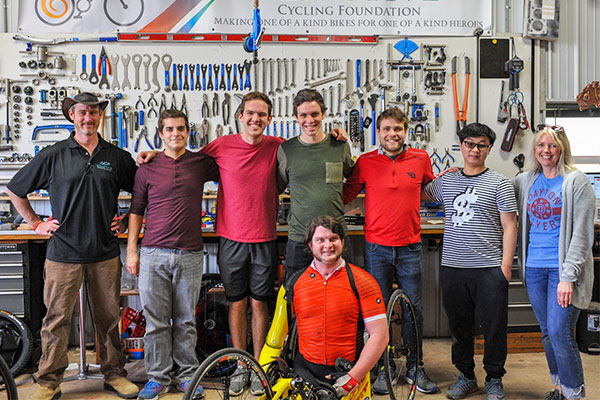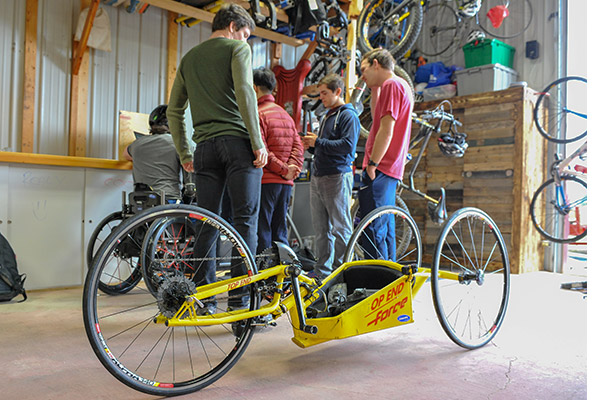Dayton Engineer
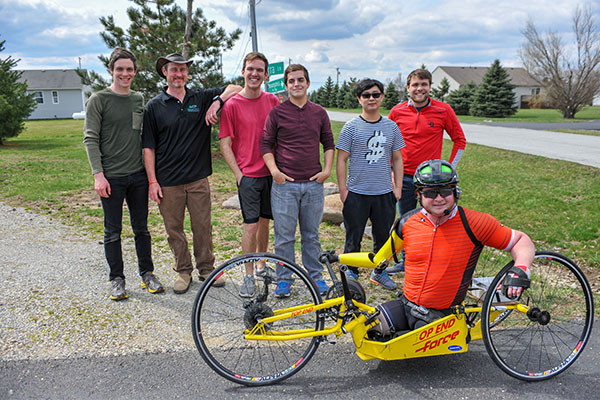
UD Engineering Students Improve a Marine Veteran's Quality of Life
By Amber Humphrey and Shawn Robinson
Quality of Life Plus (QL+), a non-profit organization headquartered in McLean, Va., is sponsoring a capstone project at the University of Dayton (UD) that will dramatically improve a disabled veteran's quality of life.
Five UD seniors are designing and building a "voice-activated shifting device" as their capstone project for Marine veteran and triple amputee, Staff Sergeant Timothy Brown. Brown, a QL+ "Challenger," is collaborating with the student team to create a device that will allow him to use his voice to activate the derailleurs on his handcycle to shift gears. The device will be lightweight, durable, weatherproof, portable and simple to use. Although this device will be designed specifically for Brown, it has the potential to serve many more people.
QL+ student engineers develop novel technical solutions to assist and improve the quality of life for our wounded veterans and first responders.
"QL+ provides challenges for senior design and engineering students, allowing them to work directly with our wounded veterans, harnessing technology and common-sense engineering practices to improve their daily lives," said Quality of Life Plus founder, Jon Monett. "Timothy Brown’s participation in the program is invaluable. He is giving our engineering students the opportunity to focus their passion and talent on helping our nation's heroes. Timothy is helping us build better engineers."
Brown joined the Marine Corps in 2003 and deployed to Iraq and Afghanistan as a radio operator. In 2008, he became an explosive ordnance disposal (EOD) technician. Two years later, Brown deployed to Afghanistan again as a member of the 1st EOD Company. On his third deployment, he was injured, resulting in the amputation of three of his limbs. He was discharged from the hospital in May 2011 and was readmitted 21 times. He started handcycling in February of 2012 to improve his fitness. In the six months after he started handcycling, he logged in over 1000 miles. Brown continues to cycle several days a week. He also participates in multi-day cycling events, riding several hundred miles a week in various locations around the country.
The student engineers began working on this project in September of 2018. After testing the prototype, they met Brown on April 6 at the Adaptive Cycling Foundation Headquarters in Mechanicsburg, Ohio. Scott Moro, founder of the Adaptive Cycling Foundation, mentored the students and assisted them with their testing on April 6. Brown lives in Washington, D.C., and is currently a student at Georgetown University. He traveled to Ohio to meet the students and work with them on testing the device and providing valuable feedback.
"We work with engineering programs that are respected globally," Monett added. "QL+ is excited to work with the University of Dayton. We are very impressed with the faculty support and the students working on Timothy’s project. They are dedicated and passionate about the work, and it shows."
Throughout the academic year, QL+ mentors, monitors and supports the collaboration between the veterans and the student teams. At the conclusion of the academic year, the student teams formally present the completed assistive device or modified hardware to the veteran for use in their daily life. Each project is unique, and the innovations created give the veterans the confidence and independence to engage in the activities they enjoy. While these assistive devices are tailored to the needs of the individual participating veteran, the solutions frequently help other injured veterans.
QL+ is headquartered in McLean, Va., with its major lab at California Polytechnic University in San Luis Obispo, Calif. It also has a dedicated lab at the Colorado School of Mines in Golden, Colo. Established QL+ programs also operate at Virginia Tech, Xavier University, the University of Cincinnati, Ohio University, San Diego State University, Virginia Commonwealth University, George Mason University and the University of Colorado, Boulder. In the Fall, George Washington University will be joining the QL+ family.

